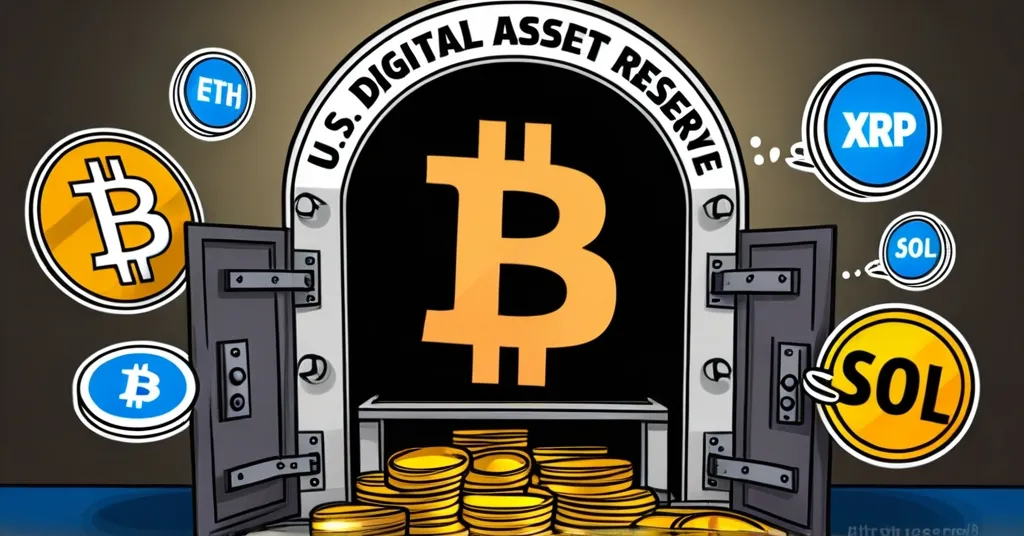Vinny Lingham’s Poll Sparks Debate: Should U.S. Crypto Reserve Be Bitcoin-Only?

Vinny Lingham’s Crypto Reserve Poll Ignites Debate Over Bitcoin and Altcoins
Vinny Lingham, a notable internet entrepreneur, stirred up the cryptocurrency community with a recent poll on X (formerly Twitter) about the proposed U.S. digital asset reserve. Should it be exclusively Bitcoin, or should it include other cryptocurrencies like XRP, ETH, and SOL? With Bitcoin currently trading at $102,000, up 2.51% in the last 24 hours, the debate couldn’t be timelier.
- 62% favor Bitcoin-only reserve in Lingham’s poll
- Strategic Bitcoin Reserve proposed by Senator Lummis
- Ripple CEO pushes for XRP inclusion amidst opposition
- Potential impact on Bitcoin’s price and market dynamics
Background on the Strategic Bitcoin Reserve
The idea of a Strategic Bitcoin Reserve was floated by Senator Cynthia Lummis last summer. In simple terms, a reserve is like a big storage of valuable assets, akin to how countries might keep gold in a vault. Lummis’s proposal suggests the U.S. government should buy 200,000 BTC each year for five years, totaling 1 million BTC. Former President Donald Trump endorsed this during his campaign and, upon taking office, signed an executive order to form a task force to assess its feasibility.
The Poll and Its Implications
Lingham’s poll, which received just under 1,000 votes, showed a clear preference: 62% supported a Bitcoin-only reserve, while 38.1% believed other cryptocurrencies should be included. This poll highlights the ongoing tension within the crypto community about the future of digital asset policy in the United States.
Industry Perspectives
Bitcoin maximalists argue that including other types of cryptocurrencies (altcoins) could dilute the reserve’s purpose and complicate its management. They see Bitcoin as the gold standard of cryptocurrencies. On the other hand, proponents of altcoins, like Ripple CEO Brad Garlinghouse, believe a diverse reserve would better represent the potential of the broader crypto market. Garlinghouse has been vocal about including XRP, even meeting with the U.S. president to advocate for this.
However, insiders close to the Trump administration suggest there might be “zero chance” for XRP in the reserve, emphasizing the preference for a Bitcoin-only approach. This underscores the fierce debate between Bitcoin advocates and those pushing for a more inclusive reserve.
Potential Market Impacts
The establishment of a Strategic Bitcoin Reserve could significantly influence the market. Increased demand from the U.S. government could drive Bitcoin’s price even higher, enhancing its adoption as a recognized asset class. Conversely, excluding altcoins might lead to increased scrutiny or volatility in their markets, potentially stifling innovation elsewhere in the crypto ecosystem.
Global Perspective
This debate isn’t confined to the U.S. Globally, figures like Binance’s Changpeng Zhao have advocated for similar reserves in the European Union, indicating a growing interest in how digital assets could play a role in national reserves worldwide.
Political Dynamics
The political landscape adds another layer of complexity. Tensions between Ripple and the Trump administration, possibly due to past political donations, could influence the decision on XRP’s inclusion. This shows that the debate is not just about cryptocurrency preferences but also encompasses broader political and economic considerations.
Effective Accelerationism and Bitcoin Maximalism
From an effective accelerationism perspective, a Bitcoin-only reserve could accelerate the adoption of decentralized technologies globally. Bitcoin maximalists believe that focusing solely on Bitcoin would solidify its position as the premier digital asset. However, acknowledging the roles of altcoins and other blockchains is crucial, as they often fill niches that Bitcoin does not serve well, promoting a more diverse and robust ecosystem.
Key Questions and Takeaways
- Should the U.S. digital asset reserve include only Bitcoin, or should it also include altcoins like XRP, ETH, and SOL?
The U.S. digital asset reserve should focus on Bitcoin due to its established status and widespread acceptance, but including altcoins could reflect the diversity of the crypto market and potentially benefit other projects.
- What are the potential benefits and drawbacks of a Bitcoin-only reserve versus a reserve that includes multiple cryptocurrencies?
A Bitcoin-only reserve provides clarity and simplicity, potentially strengthening Bitcoin’s position, but a multi-crypto reserve could hedge against Bitcoin-specific risks and support broader industry growth.
- How might the inclusion or exclusion of altcoins affect the broader cryptocurrency market and industry?
Including altcoins could boost their legitimacy and market value, while excluding them might lead to increased volatility and a focus on Bitcoin, possibly stifling innovation in other cryptocurrencies.
- What impact could the formation of a Strategic Bitcoin Reserve have on Bitcoin’s price and adoption?
A Strategic Bitcoin Reserve could significantly drive up Bitcoin’s price due to increased demand, and enhance its adoption as a recognized asset class by governments.
- How does the lobbying by Ripple and other entities influence the decision-making process for the reserve’s composition?
Lobbying efforts by Ripple and similar entities could sway the composition of the reserve, but political dynamics and the preferences of key figures like Trump may ultimately determine the final decision.



